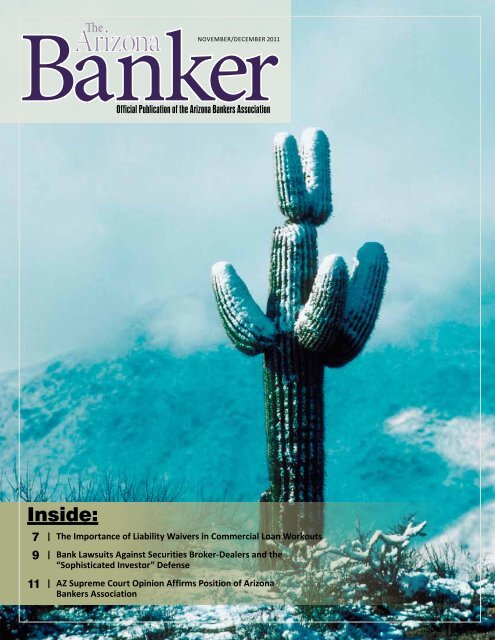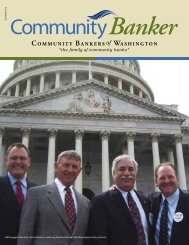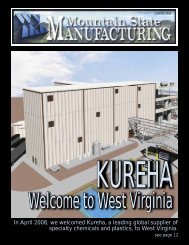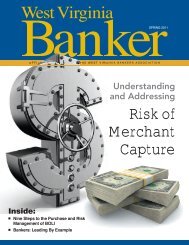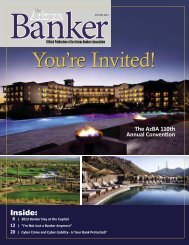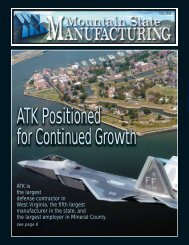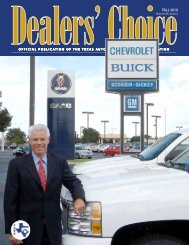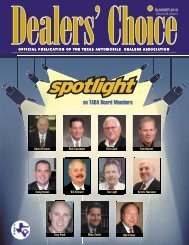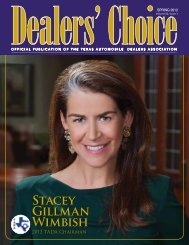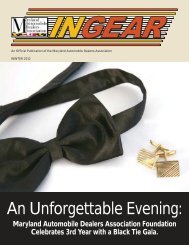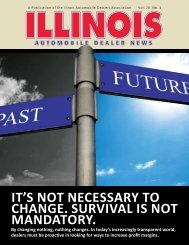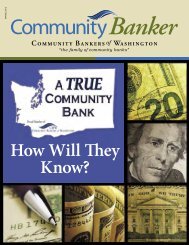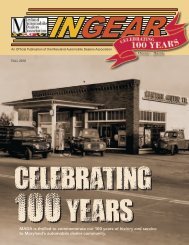Inside: - Media Communication Group
Inside: - Media Communication Group
Inside: - Media Communication Group
- No tags were found...
Create successful ePaper yourself
Turn your PDF publications into a flip-book with our unique Google optimized e-Paper software.
NOVEMBER/DECEMBER 2011<br />
<strong>Inside</strong>:<br />
7 | The Importance of Liability Waivers in Commercial Loan Workouts<br />
9 | Bank Lawsuits Against Securities Broker-Dealers and the<br />
“Sophisticated Investor” Defense<br />
11 | AZ Supreme Court Opinion Affirms Position of Arizona<br />
Bankers Association
When it comes to your security, trust the company that has been securing financial<br />
institutions for more than 35 years. Now serving Arizona and surrounding areas!<br />
Hamilton:<br />
e're a safe company<br />
for you to rely on.<br />
We offer a full line<br />
of security services:<br />
• Sales<br />
• Service<br />
• Maintenance<br />
• Installation<br />
• Project Managment<br />
• System Design<br />
rely on Hamilton Safe for all of your<br />
drive-up equipment. We build the<br />
ost advanced drive-up systems including<br />
d, upsend and high-load capacity<br />
systems. We also design, engineer and<br />
sted vaults and vault doors, custom and<br />
fe deposit boxes, teller lockers, night<br />
depositories, bullet resistive windows and many other<br />
products to serve wherever reliable security is required.<br />
Our dedication to simplicity of design helps ensure<br />
superior quality, reliable performance and affordable<br />
prices. If you’re planning to invest in new equipment,<br />
please give us a call or visit our website. We’ll provide<br />
high-performance equipment and service.<br />
You can rely on it.<br />
We know Financial Security.<br />
Video Surveillance Systems<br />
• Analog Cameras<br />
• Megapixel IP Cameras<br />
• Digital Video Recorders<br />
• Video Management Software<br />
Access Control Systems<br />
• Card or Biometric Identification<br />
• Entrance Control Systems<br />
• Revolving Doors and Turnstiles<br />
Intrusion Alarm Systems<br />
• Intrusion Detectrion<br />
• Environmental Monitoring<br />
• Wireless Devices<br />
• Remote Video Monitoring<br />
• Recurity Racks and Cabinets<br />
• Security Consoles<br />
• Visitor/ID Management<br />
• Intercom Systems<br />
• Electrified Locking Hardware<br />
• Vault & Safe Protection<br />
• Cellular Back-up<br />
• Perimeter Detection<br />
3143 Production Drive, Fairfield, Ohio 45014 • Telephone: 513-874-3733<br />
www.hamiltonsafe.com<br />
Ask us about our physical<br />
security solutions too!<br />
Contact Us Today!<br />
Dakota Security Systems, Inc.<br />
5861 South Kyrene Road<br />
Tempe, AZ 85283<br />
Ph. 480-838-1943<br />
www.dakotasecurity.com<br />
Email: azservice@dakotasecurity.com<br />
24/7/365 Emergency Service!<br />
State of Arizona ROC#: 164593, L-67
A MESSAGE FROM THE PRESIDENT<br />
By paul hickman, President & CEO<br />
2011: An Interesting Year<br />
As we enter the holiday season I find<br />
myself reflecting on a very dynamic<br />
and interesting year for banking and<br />
for the members of the arizona bankers<br />
Association. As the banking regulators<br />
continue to implement the Dodd-Frank Act,<br />
and Arizona slowly begins recovering from<br />
the housing crash, 2012 should prove equally<br />
challenging and interesting.<br />
We began the year focused on high unemployment<br />
and slow economic growth. The<br />
unemployment rate in Arizona has been above<br />
nine percent all year. Growth has been in the<br />
anemic one percent range all year as well. The<br />
epicenter of the contraction was in the housing<br />
sector and until that market finds equilibrium,<br />
Arizona is in for more tough sledding.<br />
The year ended with a European debt crisis<br />
poised to send the countries of the E.U. into<br />
another recession and possibly endanger the<br />
fragile recovery in the United States. As I write<br />
this, the crisis has toppled the governments in<br />
Greece and Italy; and the future of the euro as<br />
the common currency for the 17-nation Eurozone<br />
is in serious doubt.<br />
2011 also saw the Occupy Wall Street<br />
protests go global. There were riots in Rome,<br />
and in Oakland, California protesters managed<br />
to temporarily shut down the fifth busiest port<br />
in the country. London’s St. Paul’s Cathedral<br />
also temporarily closed for the first time since<br />
World War II. Besides a general dissatisfaction<br />
with the distribution of wealth, it is not<br />
absolutely clear what their goals are.<br />
It is critically<br />
important that we as<br />
an industry continue<br />
to educate the public<br />
on our unique and<br />
vital role in any<br />
modern economy.<br />
That said, however, there are always reasons<br />
for optimism in Arizona. In terms of job<br />
growth the W.P. Carey School of Business now<br />
ranks Arizona tenth-best in the country – up<br />
from dead last in 2010. Our legislature was<br />
able to move an ambitious corporate tax cut<br />
and jobs package through their ranks and to<br />
the governor, who signed the measure in April.<br />
Our political and business leaders recognize<br />
the vital importance of diversifying our state<br />
economy beyond its recent historical dependence<br />
on housing. And, the sun will continue<br />
to shine in Arizona, bringing us a key ingredient<br />
in economic growth: people.<br />
In banking, the drama surrounding the<br />
Durbin Amendment debit card interchange fee<br />
cap unfolded at a high volume. It began with the<br />
retail and banking industries working the Federal<br />
Reserve and Capitol Hill at cross purposes to<br />
preserve and prevent, respectively, the implementation<br />
of the amendment. In June the Fed issued a<br />
final rule granting the retailers a $7 billion annual<br />
windfall. The $64,000 question now becomes<br />
‘will the retailers pass their savings on to their<br />
customers’ If the Australian experience is any<br />
guide, the smart money is on ‘probably not.’<br />
One thing, however, is clear. They don’t like<br />
banks. This means it is critically important<br />
that we as an industry continue to educate the<br />
public on our unique and vital role in any modern<br />
economy. Mortgage banking, investment<br />
banking, commercial and retail banking are all<br />
conflated in the popular conscience, making<br />
our job that much more difficult. I have found<br />
the Arizona Bankers Association’s brochure<br />
titled Bank’s Give Back to be a very helpful tool in<br />
this endeavor. We sent it to every media outlet<br />
in the state earlier this year. Since then I have<br />
done a battery of interviews where I highlighted<br />
the significant economic and philanthropic<br />
contributions of our industry.<br />
Given that 2012 is an election year, I don’t<br />
see much controversial banking legislation<br />
coming our way from Washington. What this<br />
president and all incumbents in Congress are<br />
motivated by are the high unemployment and<br />
slow growth numbers I mentioned at the beginning<br />
of this column. Many of their political<br />
futures will depend on significant improvement<br />
in those numbers.<br />
n president’s message — continued on page 12<br />
4 www.azbankers.org
A legal partner who you can trust to<br />
help with complicated deals.<br />
Jeff Ekbom<br />
Partner<br />
602.212.8524<br />
1850 N. Central Avenue<br />
Suite 2100<br />
Phoenix, AZ 85004<br />
Phoenix<br />
Kansas City<br />
Saint Louis<br />
Jefferson City<br />
Overland Park<br />
Wichita<br />
Omaha<br />
Washington, D.C.<br />
The value of having a legal partner as advisor<br />
to your bank is the ability to understand the<br />
finer points of a relationship, and the efficiency<br />
in completing the deals. Stinson Morrison<br />
Hecker’s banking attorneys delve deeply and<br />
quickly into the intricacies of your bank to help<br />
negotiate solutions that offer optimal results.<br />
A firm you can trust.<br />
Stinson.com.<br />
The choice of a lawyer is important and should not be based solely on advertisements.<br />
SMH_AZ Banker_MarApril 2011.indd 1<br />
3/9/11 9:50 AM
111 West Monroe, Suite 440<br />
Phoenix, Arizona 85003<br />
Phone: (602) 258-1200 • Fax: (602) 258-8980<br />
AzBA BOARD OF DIRECTORS<br />
2011-2012<br />
James Lundy, Chairman<br />
President & CEO<br />
Alliance Bank of Arizona<br />
Lynne B. Herndon, Chairman-Elect<br />
City President<br />
BBVA Compass<br />
Mike Thorell, Vice Chairman<br />
President<br />
Pinnacle Bank<br />
Randy Yenerich, Immediate Past Chairman<br />
President & CEO<br />
Commerce Bank of Arizona<br />
Benito Almanza<br />
Arizona President<br />
Bank of America<br />
Toby Day<br />
Market President<br />
Arizona Business Bank<br />
Gail Grace<br />
President & CEO<br />
Sunrise Bank of Arizona<br />
Steve Johnson<br />
President<br />
BMO Harris Bank NA<br />
Chuck Luhtala<br />
President<br />
Canyon Community Bank<br />
Joe Stewart<br />
Chairman & CEO, Arizona<br />
JP Morgan Chase Bank NA<br />
Gerrit Van Huisstede<br />
Regional President<br />
Wells Fargo Bank<br />
Candace Wiest<br />
President & CEO<br />
West Valley National Bank<br />
AzBA Staff<br />
Paul Hickman<br />
President & CEO<br />
Stacey Langford<br />
VP, Member Services<br />
Jan Arredondo<br />
Director, Administration<br />
Stacey<br />
Paul<br />
& Jan<br />
AzBA would<br />
like to wish<br />
you and yours<br />
a joyous<br />
holiday season<br />
For additional information about the Arizona Bankers<br />
Association visit us online at www.azbankers.org.<br />
6 www.azbankers.org
The Importance of<br />
Liability Waivers in<br />
Commercial<br />
Loan Workouts<br />
By David A. Sprentall, Partner, Snell & Wilmer, Phoenix, AZ<br />
Due to the lender liability litigation fad of the late 1980s and early 1990s,<br />
most institutional lenders significantly tightened their documentation,<br />
particularly in workouts and restructurings. Various provisions such as<br />
pre-negotiation agreements, reaffirmations of security and waivers of<br />
lender liability claims became common. While lender’s counsel have<br />
generally believed these provisions are enforceable in a commercial loan<br />
context, it is always interesting to see a court agree.<br />
In the recent case of interpharm,<br />
inc. v. wells fargo bank, national<br />
association, the u.s. second circuit<br />
court of appeals upheld a lower<br />
court decision dismissing various<br />
claims made by a defaulted borrower<br />
against Wells Fargo. The facts of the<br />
case are relatively straightforward and<br />
not unusual. Interpharm was a commercial<br />
borrower with a revolving<br />
credit facility secured by accounts receivable<br />
and inventory. As Interpharm’s<br />
business deteriorated, there were various<br />
defaults on the loan agreement that<br />
resulted in workout negotiations and<br />
increasingly restrictive credit terms.<br />
Throughout the workout, Wells Fargo<br />
and Interpharm entered into a series of<br />
forbearance agreements, each of which,<br />
in addition to other terms, included a<br />
waiver by the borrower of any claims<br />
against Wells Fargo. Ultimately,<br />
Interpharm paid off the debt through<br />
the sale of assets, but sued Wells Fargo<br />
alleging breach of contract, breach of<br />
the duty of good faith and fair dealing,<br />
tortuous interference with business<br />
expectations, unjust enrichment and<br />
breach of fiduciary duty - all common<br />
lender liability claims.<br />
Wells Fargo sought to dismiss<br />
these claims based on the releases of<br />
lender liability contained in each of the<br />
forbearance agreements. Interpharm, in<br />
turn, tried to argue that dismissal was<br />
not appropriate because the waivers<br />
were a product of “economic duress.”<br />
Essentially, Interpharm argued that<br />
it had no choice but to agree to the<br />
terms of the forbearance agreements<br />
and waivers or file for bankruptcy that<br />
would have made it impossible to continue<br />
its business.<br />
The court pointed out that in order<br />
to avoid a contract on the ground of<br />
economic duress, the borrower would<br />
have to show that the agreement was<br />
procured by means of (i) a wrongful<br />
threat that (ii) precluded the exercise<br />
of its free will. After a lengthy analysis,<br />
the court concluded that a threat to<br />
exercise a legal right could not be the<br />
basis for a claim of economic duress. In<br />
other words, as long as the lender had<br />
no duty to continue to provide credit as<br />
a result of the borrower’s default, the<br />
fact that the lender may have engaged<br />
in aggressive workout tactics did not<br />
make its actions wrongful. The case<br />
was dismissed since the borrower<br />
could not overcome the waivers in the<br />
forbearance agreements.<br />
A few observations:<br />
<br />
The lender’s position was<br />
strengthened by having a<br />
clearly drafted waiver of claims<br />
in each of the forbearance<br />
agreements (note that this case<br />
was decided under New York<br />
laws - individual state laws may<br />
vary on the enforceability and<br />
requirements for a valid waiver<br />
of claims).<br />
<br />
Although the lender aggressively<br />
pursued its rights, it always had<br />
a definite material default to<br />
point to.<br />
<br />
The lender appears to have only<br />
proceeded to grant concessions<br />
when there was a written<br />
forbearance agreement - in other<br />
words, the process remained<br />
formal rather than relying<br />
on verbal agreements and<br />
understandings.<br />
<br />
The Court noted several<br />
times that the forbearance<br />
agreement expressly<br />
stated that it superseded<br />
all other negotiations and<br />
was unambiguous - both of<br />
which are crucial in keeping<br />
out evidence of contrary<br />
negotiations.<br />
In short, this case demonstrates the<br />
benefits of a tightly run workout process<br />
Arizona Banker ⏐ November/December 2011 7
with well-documented forbearance agreements. Whether or not<br />
the lender would have prevailed on the lender liability claims,<br />
it saved significant time and expenses by having those claims<br />
dismissed based on the waivers. w<br />
©2011 All rights reserved. The purpose of this legal article is to provide<br />
readers with information on current topics of general interest<br />
and nothing herein shall be construed to create, offer or memorialize<br />
the existence of an attorney-client relationship. The content should<br />
not be considered legal advice or opinion, because it may not apply<br />
to the specific facts of a particular matter. Please contact a Snell &<br />
Wilmer attorney with any questions.<br />
David A. Sprentall is a partner in the Phoenix, Arizona office of Snell<br />
& Wilmer. His practice is concentrated in real estate law, commercial<br />
law, financial institutions regulation law, real estate finance law and<br />
construction law.<br />
WE REPRESENT BANKS THAT HAVE TAKEN LOSSES ON THEIR INVESTMENTS.<br />
WE DO SO ON CONTINGENCY. WE DON’T GET PAID UNLESS YOU GET PAID.<br />
THINK YOU HAD TO WRITE OFF THOSE INVESTMENT LOSSES<br />
THINK AGAIN.<br />
www.schneiderwallace.com/az.php<br />
(480) 428-0142<br />
8 www.azbankers.org
Bank Lawsuits<br />
Against Securities Broker-<br />
Dealers and the “Sophisticated<br />
Investor” Defense<br />
By Garret W. Wotkyns, Schneider Wallace Cottrell Brayton Konecky LLP<br />
During the early- and mid- 2000s, many regional and local banks in Arizona<br />
and elsewhere invested in structured finance products.<br />
Among other things, many banks<br />
invested then in mortgage-backed<br />
securities, sometimes called MBS for<br />
short, and collateralized debt<br />
obligations, often simply called CDO’s.<br />
As we now know, such investment<br />
products in many instances posed severe<br />
risks to those who invested in them – bank<br />
and non-bank investors alike. And a whirlwind<br />
of litigation and Financial Industry<br />
Regulatory Authority (“FINRA”) arbitration<br />
proceedings about these investments<br />
has ensued. In these actions, investors<br />
assert that they were in one way or another<br />
wrongfully directed into these investments<br />
either by their securities broker-dealer, the<br />
issuer of the securities in question and/or<br />
other involved parties.<br />
A great many such actions, especially<br />
FINRA arbitrations have been brought in the<br />
last several years by regional and local banks.<br />
Unsurprisingly, from these actions certain<br />
patterns have started to emerge. When a<br />
bank brings a FINRA arbitration against<br />
its securities broker-dealer, for instance,<br />
asserting that the broker-dealer wrongfully<br />
directed the bank into an MBS or CDO<br />
investment, it can expect immediately to see<br />
in response what has come to be known as<br />
the “sophisticated investor” defense.<br />
This defense is just what it sounds like:<br />
namely, that the suing bank had enough<br />
industry knowledge and experience to be<br />
capable of evaluating risks associated with<br />
investing in MBS or a CDO – and was thus<br />
able to fully and properly evaluate the risks<br />
of any particular disputed transaction.<br />
Large securities broker-dealers time and<br />
again have asserted that this defense protects<br />
them from liability in actions brought<br />
by banks.<br />
Arizona banks that suffered losses<br />
from investing in such products should take<br />
heart: the sophisticated investor defense<br />
in actions brought by banks has shown<br />
a pattern of becoming less successful in<br />
recent FINRA arbitrations, according to a<br />
recent commentary by one of the officers of<br />
the non-profit Pace Investor Rights Clinic,<br />
Edward Pekarek.<br />
For one thing, as he notes, common law<br />
negligence claims (which are frequently<br />
advanced in FINRA arbitration by banks<br />
and other investors) are not properly subject<br />
to this defense. Such negligence claims, he<br />
continues, turn on the underlying duty of<br />
care owed to an investor by its broker-dealer.<br />
NASD Rule 2310 – Recommendations to<br />
Customers (Suitability) defines the scope of<br />
that duty and when it exists in the context<br />
of brokered securities purchase transactions<br />
– and Rule 2310 does not even mention the<br />
sophistication of the investor.<br />
For another, the SEC itself has noted that<br />
the mere disclosure of risks associated with<br />
the purchase of any particular security does<br />
not relieve a securities broker-dealer of its<br />
freestanding duty to make sure that those securities<br />
are suitable investments for its client.<br />
The SEC has also stated that not only must<br />
the client of a regulated broker-dealer be<br />
sufficiently sophisticated to fully understand<br />
the risks involved with the investment, the<br />
client also must be able to bear those risks.<br />
And the SEC has said, finally, that the ability<br />
to bear risks, standing alone, does not satisfy<br />
its investor suitability rules.<br />
In short, banks that have taken losses on<br />
structured finance products like CDOs and<br />
MBS in recent years may be well-served to<br />
reevaluate those losses and consider taking<br />
action about them. You may not be too big<br />
to fail, but neither are you too big to sue. w<br />
Garrett W. Wotkyns is head of the financial services<br />
practice at Schneider Wallace Cottrell Brayton<br />
Konecky LLP, a boutique law firm with offices in Arizona,<br />
California and Texas. He currently represents<br />
numerous banks seeking recovery from securities<br />
broker-dealers concerning allegedly unsuitable<br />
investments. Mr. Wotkyns is a frequent speaker,<br />
writer and continuing legal education instructor<br />
concerning financial services litigation. He received<br />
his law degree from the University of Chicago Law<br />
School, where he was a staff member of The University<br />
of Chicago Law Review.<br />
Arizona Banker ⏐ November/December 2011 9
Sylvia hopes to retire in<br />
8 years and travel abroad.<br />
Help Her Reach Her Dreams with Financial LifeTimes<br />
Connect with customers like Sylvia with our financial guide for 50-60 somethings to help them:<br />
Establish a financial team<br />
Allocate and protect<br />
their assets effectively<br />
Learn to downsize with ease<br />
Call 602.547.7020 x104 to order your customized Financial LifeTimes series.<br />
Learn more! Use your smartphone to scan the QR code or<br />
go to SherriMayCo.com/FLT<br />
Ask us about the entire Financial LifeTimes series<br />
SHERRIMAYCO.COM | @SHERRIMAYCO | 602.547.7020 X104<br />
10 www.azbankers.org
AZ Supreme<br />
Court Opinion<br />
In September 2005, Julia Vasquez, a<br />
Tucson homeowner, refinanced her home<br />
by executing a promissory note secured<br />
by a deed of trust in favor of Saxon Mortgage.<br />
The deed of trust, recorded that<br />
month, named the company as beneficiary.<br />
Shortly thereafter, Saxon Mortgage<br />
assigned the note to Deutsche Bank by<br />
endorsing the note in blank and without<br />
recourse to Saxon Mortgage. That assignment<br />
was not recorded.<br />
Ms. Vasquez later defaulted under<br />
the promissory note. On August 29,<br />
2008, Deutsche executed a substitution<br />
of trustee pursuant to statute. The<br />
substitution of trustee was recorded on<br />
September 12, the same date that the new<br />
trustee recorded a notice of trustee’s sale.<br />
Affirms Position of Arizona<br />
Bankers Association<br />
By Brad Vynalek, Quarles & Brady LLP<br />
A recent Arizona Supreme Court opinion that the recording of an<br />
assignment of deed of trust is not required prior to the filing of a notice of<br />
trustee’s sale has affirmed the position advocated by the Arizona Bankers<br />
Association. The Opinion was offered in the case of Vasquez v. Saxon<br />
Mortgage, Inc.<br />
On October 29, an agent of Saxon<br />
Mortgage executed an Assignment of the<br />
Deed of Trust, assigning all its beneficial<br />
interest to Deutsche Bank. The document,<br />
recorded on November 7, stated the<br />
assignment was retroactive to August 11.<br />
Eventually, Ms. Vasquez filed for<br />
bankruptcy protection. During the<br />
course of the proceedings, she argued the<br />
notice of trustee’s sale recorded by the<br />
new trustee was invalid because Saxon<br />
Mortgage did not record an assignment<br />
of the deed of trust prior to the recording<br />
of the notice of trustee’s sale.<br />
Given the importance of the issue, the<br />
Bankruptcy Court certified two questions<br />
to the Arizona Supreme Court – (1)<br />
Was the recording of an assignment deed<br />
of trust required under the above circumstances;<br />
and (2) Must the beneficiary of<br />
a deed of trust being foreclosed have the<br />
right to enforce the second obligation<br />
The Bankers Association was<br />
represented in the supreme Court<br />
proceedings by the Quarles & Brady<br />
law firm, which filed an Amicus<br />
Curiae brief on behalf of the association<br />
and the Greater Phoenix Chamber of<br />
Commerce. The Quarles & Brady legal<br />
team was made up of attorneys Brad<br />
Vynalek, Brian Howie, Mike Catlett and<br />
Susan Boswell.<br />
According to Mr. Vynalek, if the<br />
Court had ruled that such assignments<br />
were required, “it potentially could have<br />
at a minimum disrupted many residential<br />
and commercial foreclosures underway<br />
in Arizona and added a new layer of<br />
administration for lenders, as well as<br />
undermined portfolio assignments.”<br />
In its unanimous opinion, the Court<br />
held that the Arizona statute requiring<br />
a notice of trustee’s sale to be recorded<br />
“does not require that an assignment<br />
of a deed of trust be recorded before<br />
recording the notice of trustee’s sale.”<br />
The Court added: “While the failure to<br />
record an assignment of deed of trust<br />
might leave an assignee unprotected<br />
against claims by some purchasers or<br />
Arizona Banker ⏐ November/December 2011 11
creditors, it does not affect a deed’s validity as to the obligor.”<br />
Concluding that an answer to the second question was unnecessary,<br />
it declined to answer it.<br />
Even with the ruling, the Quarles & Brady team has<br />
recommended that, where possible, an assignment of deed<br />
of trust be recorded as early as possible to avoid any issues<br />
with competing creditors or purchasers. “The key is to have<br />
all documents in order and to be able to show a chain of title,”<br />
added Mr. Vynalek, “and ideally all of that should be resolved<br />
before a possible bankruptcy filing.” If the assignment is not<br />
recorded, however, a subsequent trustee’s sale will no longer<br />
be subject to challenge based on the failure to record an<br />
assignment of deed of trust in at least situations involving<br />
promissory notes endorsed in blank. w<br />
n president’s message — continued from page 4<br />
2012 will also be the first election with the newly configured<br />
congressional and state legislative districts that flow<br />
from the decennial census. As I write this column, Arizona’s<br />
commission redistricting structure is being stress-tested<br />
by the governor exercising her constitutional authority to<br />
replace members, and a probable federal court challenge to<br />
the final maps. How this may impact the make-up of our<br />
congressional delegation and state legislature is uncertain.<br />
What is certain is that it will provide a lot of excitement<br />
along the way.<br />
Stay tuned, and have a great holiday season. w<br />
Brad Brian Mike Susan<br />
Vynalek Howie Catlett Boswell<br />
It is my honor to serve this great industry. My aim is to serve as your resource;<br />
I may be reached at phickman@azbankers.org or 602.258.1200.<br />
Quarles & Brady LLP is a full-service law firm that specializes in all aspects of<br />
financial services and bank representation, ranging from loan enforcement/<br />
litigation to bankruptcy/restructuring and real estate transactional work. For<br />
more information, you can contact Brad Vynalek at 602-229-5261 or brad.<br />
vynalek@quarles.com.<br />
Talk to Power.<br />
Unite with fellow bankers at the<br />
2012 ABA Government Relations Summit,<br />
March 19–21, in the nation’s capital to<br />
let lawmakers and regulators know where<br />
you stand on issues affecting the banking<br />
industry. Hear from top government officials<br />
and make the case that your bank is an<br />
engine of economic growth in<br />
your community.<br />
Visit aba.com/Summit today.<br />
12 www.azbankers.org
REACH YOUR<br />
TARGET AUDIENCE<br />
AFFORDABLY<br />
Find out how targeted advertising can produce<br />
real, measurable results for your organization.<br />
ADvERTIsE AND<br />
GET REsULTs<br />
Don F. Brown, Project Manager<br />
<strong>Media</strong> <strong>Communication</strong>s <strong>Group</strong><br />
Spectrum Ink Sales & Marketing<br />
813-423-1429<br />
don@spectruminkpublishing.com<br />
COMMERCIAL<br />
REAL ESTATE<br />
SPECIALISTS<br />
With<br />
More than 25 years of<br />
experience in Arizona<br />
and a reputation for...<br />
100+ RECEIVERSHIPS<br />
SINCE 1987<br />
a penny<br />
saved...<br />
Protecting Assets<br />
Reducing Costs<br />
Adding Value<br />
Since 1987<br />
MANAGEMENT | RECEIVERSHIP | LEASING | SALES<br />
Case, Huff & Associates, Inc.<br />
Commercial Real Estate Specialists<br />
340 E. Palm Lane Suite 230<br />
Phoenix, AZ 85004<br />
602.252.9300 | 602.252.6860 fax<br />
www.casehuff.com<br />
Arizona Banker ⏐ November/December 2011 13
uilt for<br />
change<br />
Financial institutions operate in a world characterized by competition,<br />
consolidation and complexity – an environment that requires the ability<br />
to both recognize opportunities and manage risks. GT helps financial<br />
institutions navigate this challenging environment, from advising on<br />
loans, workouts, financing techniques, regulatory/advisory needs and<br />
new product development to providing tax analysis and dispute<br />
resolution services. We offer practical, business-oriented legal counsel<br />
on a local, national and international basis.<br />
Greenberg Traurig, LLP<br />
2375 East Camelback Road<br />
Phoenix, AZ 85016<br />
602.445.8000<br />
www.gtlaw.com<br />
[ 1800 AT TORNEYS IN 32 LOCATIONS° | USA L AW FIRM OF THE YEAR , CHAMBERS GLOBAL AWARDS § ]<br />
The hiring of a lawyer is an important decision and should not be based solely upon advertisements. Before you decide, ask us to send you free written information about our qualifications and our experience. Prior<br />
results do not guarantee a similar outcome. Greenberg Traurig is a service mark and trade name of Greenberg Traurig, LLP and Greenberg Traurig, P.A. ©2010 Greenberg Traurig, LLP. Attorneys at Law. All rights reserved.<br />
Contact: Jeffrey H. Verbin at 602.445.8000. °These numbers are subject to fluctuation. §Greenberg Traurig was selected by Chambers and Partners as USA Law Firm of the Year, 2007. 10368
OMG! We Own What<br />
By Patricia E. Nolan and Jonathan A. Bennett, Gammage & Burnham<br />
Imagine you recently foreclosed on<br />
10 acres of land and visit it to see just<br />
what you now own. You discover that<br />
the property is as shown on the above<br />
map —but not vacant as you had thought.<br />
Instead, there is a building, half of which<br />
is located on your property and half<br />
of which is located on a neighboring<br />
property. What could have been done<br />
to prevent this sad discovery and what<br />
can you do now This was precisely the<br />
situation recently encountered by one of<br />
our clients.<br />
When underwriting a nonresidential<br />
real estate-secured loan,<br />
you should require your borrower to<br />
provide an ALTA survey. That survey<br />
should include the following Table<br />
A items from the Minimum Standard<br />
Detail Requirements for ALTA/<br />
ACSM Land Title Surveys in order to<br />
determine the existence of possible<br />
encroachments: 8, 10, 11(b), 16 and 17. See<br />
http://www.alta.org/forms/download.<br />
COUNSELOR’S CORNER<br />
cfmformID=338&type=word for an<br />
explanation of these items.<br />
You should also request that the title<br />
company, in addition to issuing your<br />
lender’s title policy, also issue ALTA<br />
Endorsement 9.3-06, commonly known<br />
as the Comprehensive endorsement,<br />
which will insure you against, among<br />
other things, any encroachment of existing<br />
improvements located on the Land<br />
onto adjoining land or any encroachment<br />
onto the Land of existing improvements<br />
located on adjoining land.<br />
With the survey, you should know<br />
of any encroachments onto (or from)<br />
the property, and your title policy, with<br />
the comprehensive endorsement, which<br />
should protect you from any encroachments<br />
that do not appear on your survey.<br />
But what if the building was constructed<br />
after you made the loan If the<br />
building was constructed by your borrow-<br />
er, then your borrower was trespassing<br />
on his neighbor’s property and so are you.<br />
You may ultimately be required to move or<br />
demolish the building.<br />
If, however, the building was constructed<br />
by the neighbor, then he is<br />
trespassing on your property and, by<br />
means of adverse possession, could eventually<br />
claim title to the property that is<br />
beneath the building, leaving you with an<br />
oddly shaped parcel and less land than<br />
you thought. You have several options<br />
to deal with the neighbor’s encroaching<br />
building, including: (i) do nothing<br />
(though any future buyer of the property<br />
may not be happy with this option and<br />
you won’t be able to deliver clean title);<br />
(ii) give the neighbor written permission<br />
to encroach on your property (countering<br />
any adverse possession claim); (iii) ask the<br />
neighbor to move it; and (iv) take action<br />
pursuant to Arizona’s quiet title statutes,<br />
A.R.S. §§ 12-1101 et seq., by sending the<br />
neighbor five dollars and a quit-claim<br />
deed that includes his waiver of any claim<br />
to possession. If the neighbor signs and<br />
returns the quit-claim deed, you no longer<br />
have to worry about the potential adverse<br />
possession consequences and should be<br />
able to tear down the portion of the building<br />
that is on your property, so long as you<br />
adequately protect the rest of the building<br />
from destruction. If the neighbor ignores<br />
your request for the quit-claim deed, you<br />
may have to pursue a quiet title action<br />
but the neighbor should ultimately be<br />
responsible for your costs and attorneys<br />
fees incurred in that litigation.<br />
For help reviewing your title commitments,<br />
title policies and surveys, please<br />
give us a call. w<br />
Patricia E. Nolan is a partner, and<br />
Jonathan A. Bennett an associate of<br />
Gammage & Burnham. Pat s areas<br />
of practice include real estate and<br />
commercial transactions, while Jon<br />
does real estate, commercial finance<br />
and transactions. For more information<br />
you can contact Pat directly<br />
at (602) 256-4426 or pnolan@<br />
gblaw.com. You can reach Jon at<br />
(602) 256- 4408, jbennett@gblaw.<br />
com. Gammage & Burnham is a full<br />
service law firm serving the Arizona business community<br />
since 1983.<br />
Arizona Banker ⏐ November/December 2011 15
REO Problems<br />
www.bhhc.com<br />
REO Solutions.<br />
Ease of doing business<br />
Flexibility of coverage options<br />
Competitive Rates<br />
One market for both REO &<br />
Forced Placed<br />
Monthly Reporting Form available<br />
Monthly Payment Plan Options<br />
...because you need complete<br />
insurance coverage, and you<br />
need it to be easy.<br />
Contact Us to get in touch with a BHHC Representative Today!<br />
Tim Gotschall<br />
John Beck<br />
TGotschall@bhhc.com<br />
JBeck@bhhc.com<br />
800.488.2930<br />
800.669.5171<br />
Berkshire Hathaway Homestate Companies<br />
Representing Financial Strength and Integrity<br />
BHHC<br />
• National resources and local connections<br />
• Available, responsive professionals who anticipate your needs<br />
• A long history of serving financial institutions (more than 600)<br />
LarsonAllen has built strong relationships with financial institutions all over the country.<br />
©2011 LarsonAllen LLP | Illustration by Alan Pranke<br />
Accounting | Assurance | Tax<br />
Consulting | Regulatory compliance | Information security<br />
Noticeably Different.<br />
16 www.azbankers.org
In just a few short weeks on January<br />
9, the Fiftieth Arizona Legislature<br />
will convene for the Second Regular<br />
Session. Since the close of the First<br />
Regular Session in April, it has been<br />
unusual Arizona politics, as usual.<br />
After the recall, the Senate was forced<br />
to elect a new member for the body’s<br />
top post, and elected Senator Steve<br />
Pierce. Pierce has been in the Senate<br />
since 2009 and, like Speaker Tobin,<br />
represents Legislative District 1.<br />
Under the<br />
Copper<br />
Dome<br />
BY Stacey Langford, AzBA<br />
Despite being<br />
an off-year<br />
for legislative<br />
elections, the<br />
House and Senate<br />
will both convene<br />
in January under<br />
new leadership<br />
Despite being an off-year for legislative<br />
elections, the House and Senate<br />
will both convene in January under new<br />
leadership. Shortly after the close of<br />
the First Regular Session, then House<br />
Speaker Kirk Adams resigned in order<br />
to run for Congress. Adams is vying for<br />
the open congressional seat being vacated<br />
by Congressman Jeff Flake in his<br />
bid for the US Senate seat being vacated<br />
by Senator Jon Kyl. The House members<br />
elected Representative Andy Tobin to<br />
replace Adams as Speaker of the House.<br />
Tobin is a business-friendly Republican<br />
from Legislative District 1, which<br />
encompasses Prescott and the surrounding<br />
area. Tobin has served in the<br />
House since 2007 and as the Majority<br />
Leader for the 2011 Legislative Session.<br />
Controversy involving the state’s<br />
redistricting process has also dominated<br />
the political news in the interim. In<br />
order to adjust for population shifts and<br />
growth, every ten years the Independent<br />
Redistricting Commission (IRC)<br />
is tasked with redrawing the state’s<br />
legislative and congressional district<br />
boundaries. This year, the Commission<br />
also needed to provide for an additional<br />
ninth Congressional district due to<br />
population growth since the last census.<br />
The drama surrounding this redistricting<br />
effort has been ongoing from the<br />
earliest steps, and continues as this<br />
magazine goes to print. It began with<br />
the selection of the commissioners, carried<br />
through the initial map proposals<br />
and is continuing with the ousting of the<br />
As the Arizona Bankers Association prepares<br />
for the upcoming legislative session, we are<br />
busy meeting with other trade associations<br />
and business lobbies to discuss and compare<br />
legislative agendas.<br />
In an historic move, Senate President<br />
Russell Pearce had his time as<br />
leader abruptly cut short. After a<br />
November 8 special election, Pearce<br />
became the first sitting Senate president<br />
in the nation and the first Arizona<br />
legislator to lose a recall election. The<br />
voters of Legislative District 18 (Mesa)<br />
replaced Pearce with Republican political<br />
newcomer, Jerry Lewis. Pearce<br />
catapulted into the national spotlight<br />
as the author of SB 1070 and continued<br />
his immigration-hawk reputation by<br />
authoring other controversial measures<br />
aimed at stemming illegal-immigration.<br />
IRC chairwoman by the Governor and<br />
Senate in November and, shortly following,<br />
the order to reinstate the chair from<br />
the Arizona Supreme Court. When the<br />
ink does dry on the map, the result will<br />
inevitably reshape Arizona politics for<br />
the coming ten years. Some legislative<br />
seats will be lost due to combining or<br />
overlapping of existing districts, some<br />
districts will become more competitive<br />
and other districts will more strongly<br />
favor one party over the other.<br />
As the Arizona Bankers Association<br />
prepares for the upcoming legislative<br />
Arizona Banker ⏐ November/December 2011 17
The political challenges facing AzBA in recent sessions should be expected<br />
in 2012, but members can also expect to be represented with top-tier<br />
government relations to waylay harmful legislation, promote legislation<br />
aimed at economic recovery and build favorable relationships with elected<br />
officials in an effort to rebuild the banking brand within the state.<br />
session, we are busy meeting with other trade associations<br />
and business lobbies to discuss and compare legislative<br />
agendas. We are also hearing from legislators directly as they<br />
begin to formulate their individual legislative agendas to serve<br />
the needs and concerns of their constituent base. The number<br />
of issues discussed and debated at the State Capitol that<br />
impact the banking industry has substantially increased in<br />
recent years and legislation that threatens banks’ ability to do<br />
business in Arizona has come from both sides of the political<br />
aisle. The political challenges facing AzBA in recent sessions<br />
should be expected in 2012, but members can also expect to<br />
be represented with top-tier government relations to waylay<br />
harmful legislation, promote legislation aimed at economic recovery<br />
and build favorable relationships with elected officials<br />
in an effort to rebuild the banking brand within the state.<br />
ON THE HILL<br />
Dodd Frank Act Implementation Update<br />
The Dodd-Frank Wall Street Reform and Consumer Protection<br />
Act (P.L. 111-203) authorizes over 300 potential rules<br />
to be issued by the various financial regulatory agencies of<br />
the federal government. The Arizona Bankers Association’s<br />
most recent analysis indicates that 64 final rules have been<br />
promulgated; 25 interim final rules have been issued; 171<br />
rules have been proposed; and 15 proposed rules are currently<br />
open for comment. (Source: Federal Reserve Bank of<br />
St. Louis, Reg Reform Rules, 2011. 20 November 2011 ).<br />
The Municipal Advisors Rule<br />
The Arizona Bankers Association opposes the Securities<br />
and Exchange Commission’s (SEC) proposed rule for the registration<br />
of municipal advisors. As currently proposed, the rule<br />
would label as “municipal advisors” banks and many bank employees<br />
providing essential and traditional banking services<br />
to their local municipalities, including day-to-day deposit,<br />
cash management, custody, trustee, and lending services.<br />
Banks and their employees are already strictly regulated by<br />
federal banking regulators with respect to all of their activities,<br />
including the services they provide to municipalities. We<br />
believe that this rule will fall hardest on small and rural community<br />
banks that could refuse to bank municipalities rather<br />
than incur the significant costs and regulatory burdens of registering<br />
their rank and file bank employees with the SEC. In<br />
this respect the proposed rule may also create an unintended<br />
consequence for municipal entities who may find themselves<br />
unable to continue banking at their local community banks.<br />
The Arizona Bankers Association wrote to the Chairman of<br />
the Securities and Exchange Commission expressing its reservations<br />
about the proposed rule earlier this year.<br />
Federal Legislative Highlights<br />
The Arizona Bankers Association strongly supports the<br />
Financial Institutions Examination Fairness and Reform Act<br />
(S. 3461), introduced by Representatives Shelley Moore Capito<br />
(R-W.Va.), Carolyn Maloney (D-N.Y.) and co-sponsored by our<br />
own David Schweikert (R-Ariz.). Among other things the bill<br />
would require timely examinations from the regulatory agency’s<br />
examiner with no exam to last longer than nine months,<br />
and examination reports to be issued within 60 days of the exit<br />
interview. The bill articulates, and would require adherence to,<br />
clear exam standards. Finally, and perhaps most significantly,<br />
the bill would create an independent ombudsman to review<br />
exam policies and investigate complaints; and an administrative<br />
appeals process with an independent administrative law<br />
judge structure. The legislation was introduced in the House<br />
in mid-November and we believe its prospects for passage and<br />
enactment look good.<br />
The Arizona Bankers Association also strongly supports<br />
bipartisan legislation introduced by Representatives Jim Himes<br />
(D-CT) and David Schweikert (R-Ariz.) to raise the current<br />
shareholder threshold for Securities and Exchange Commission<br />
registration from 500 to 2000 shareholders. This legislation<br />
would make it significantly more cost effective for small and<br />
community banks to raise capital without triggering costly and<br />
time consuming SEC registration requirements. This will allow<br />
these banks to attract the capital they need for small business<br />
lending, which is extremely important in states like Arizona<br />
with a high proportion of small businesses. This legislation<br />
passed the House 420-2 in early November. Concurrent Senate<br />
legislation has been introduced by Sens. Mark Pryor (D-Ark.)<br />
and Kay Bailey Hutchison (R-Texas). Given the very large<br />
margin of approval in the House, we are optimistic the Senate<br />
version will be approved early next year. w<br />
18 www.azbankers.org
AzBA strives to deliver timely industry news. For up to the minute information, visit<br />
AzBA’s homepage at www.azbankers.org.<br />
Latest Quarterly Banking Profile Indicates<br />
FDIC-Insured Institutions Earned $35.3 Billion<br />
Commercial banks and savings institutions insured by<br />
the Federal Deposit Insurance Corporation (FDIC) reported<br />
an aggregate profit of $35.3 billion in the third quarter of<br />
2011, an $11.5 billion improvement from the $23.8 billion in<br />
net income the industry reported in the third quarter of 2010.<br />
This is the ninth consecutive quarter that earnings registered<br />
a year-over-year increase.<br />
“We continue to see income growth that reflects improving<br />
asset quality and lower loss provisions,” said FDIC Acting<br />
Chairman Martin J. Gruenberg. “U.S. banks have come a long<br />
way from the depths of the financial crisis. Bank balance<br />
sheets are stronger in a number of ways, and the industry is<br />
generally profitable, but the recovery is by no means complete.<br />
“Ongoing distress in real estate markets and slow growth<br />
in jobs and incomes continue to pose risks to credit quality,”<br />
Acting Chairman Gruenberg added. “The U.S. economic<br />
outlook is also clouded by uncertainties in the global economy<br />
and by volatility in financial markets. So even as the banking<br />
industry recovers, the FDIC remains vigilant for new economic<br />
challenges that could lie ahead.”<br />
Financial results for the third quarter and the first nine<br />
months of 2011 are contained in the FDIC’s latest Quarterly<br />
Banking Profile, which was released November 22, 2011. Also<br />
among the findings:<br />
Loan portfolios grew slowly for a second consecutive<br />
quarter. Loan balances posted a quarterly<br />
increase for the second quarter in a row and for only the<br />
third time in the last 12 quarters.<br />
Large institutions again experienced sizable<br />
deposit inflows. Deposits in domestic offices increased<br />
by $279.5 billion (3.4 percent) during the quarter. Almost<br />
two-thirds of this increase ($183.8 billion or 65.8 percent)<br />
consisted of balances in large noninterest-bearing transaction<br />
accounts that have temporary unlimited deposit<br />
insurance coverage.<br />
The number of institutions on the FDIC’s “Problem<br />
List” fell for the second quarter in a row. The<br />
number of “problem” institutions declined from 865 to 844.<br />
This is the second time since the third quarter of 2006 that the<br />
number of “problem” banks has fallen.<br />
The Deposit Insurance Fund (DIF) balance continued<br />
to increase. The DIF balance — the net worth of the fund<br />
— rose to $7.8 billion at September 30th from $3.9 billion at June<br />
30th. Estimated insured deposits grew 3.6 percent in the third<br />
quarter. Much of this increase is attributable to the growth in<br />
balances exceeding $250,000 in noninterest-bearing transaction<br />
accounts, for which the Dodd-Frank Act temporarily extended<br />
unlimited insurance coverage through the end of 2012.<br />
The complete Quarterly Banking Profile is available at<br />
http://www2.fdic.gov/qbp on the FDIC Web site.<br />
OCC Releases Status Report on Fixing Deficient<br />
Foreclosure Practices<br />
The Office of the Comptroller of the Currency (OCC) issued<br />
a report November 22, 2011 on the actions by 12 national<br />
bank and federal savings association mortgage servicers to<br />
comply with consent orders issued in April 2011 to correct<br />
deficient and unsafe or unsound foreclosure practices.<br />
The report, “Interim Status Report: Foreclosure-Related<br />
Consent Orders,” summarizes progress on activities related to<br />
the independent foreclosure review announced November 1,<br />
2011, as well as other activities to enhance mortgage servicing<br />
operations, strengthen oversight of third-party service providers<br />
and activities related to Mortgage Electronic Registration<br />
Systems (MERS), improve management information systems,<br />
assess and manage risk, and ensure compliance with applicable<br />
laws and regulations.<br />
While much of the work to correct identified weaknesses<br />
in policies, operating procedures, control functions, and audit<br />
processes will be substantially complete in the first part of<br />
2012, other longer term initiatives will continue through the<br />
balance of 2012.<br />
Consumer Financial Protection Bureau aims to<br />
shed light on the private student loan industry<br />
The Consumer Financial Protection Bureau (CFPB) is seeking<br />
information from students, schools, industry, and other<br />
stakeholders on the private student loan market. The CFPB<br />
published a Notice and Request for Information to collect<br />
data on a series of issues impacting private student loans from<br />
origination to servicing to collection.<br />
“The private student loan market is one of the least understood<br />
consumer credit markets. It has been operating in<br />
the shadows for too long,” said Raj Date, Special Advisor to<br />
the Secretary of the Treasury on the CFPB. “Shedding light<br />
n industry updates — continued on page 25<br />
Arizona Banker ⏐ November/December 2011 19
De Rito Partners, Inc is a full-service retail brokerage operation with 27<br />
seasoned brokers. Specializing in property leasing & currently<br />
representing over 210 retail shopping centers & over 60 national & local<br />
retailers. In addition, we specialize in brokering land & investment sales<br />
state-wide.<br />
De Rito Partners Development, Inc specializing in creating<br />
extraordinary retail environments. With more than five million square<br />
feet of retail property completed, our retail development team has<br />
delivered outstanding results for shoppers, merchants, and investors.<br />
Currently redeveloping 1.1 million square feet at The Pavilions At Talking<br />
Stick.<br />
De Rito Opportunity Investors, LLC recently purchased 18 new<br />
properties, with plans to add 4 - 8 this year. Offers individually tailored<br />
retail property solutions and specializes in acquisitions of distressed<br />
properties and value added opportunities.<br />
Case, Huff & De Rito Retail LLC offering premier-quality property<br />
management services for retail properties of any size.<br />
De Rito Partners, Inc - Stan Sanchez<br />
De Rito Partners Development, Inc - Chuck Carlise<br />
De Rito Opportunity Investors, LLC - Gary Case & Tim Huff<br />
The Pavilions at Talking Stick - Matt Morrell<br />
www.derito.com<br />
www.ThePavilionsAtTalkingStick.com<br />
480-834-8500<br />
3200 E. Camelback Road, Suite 175<br />
Phoenix, AZ 85018
committeenotes<br />
The Arizona Bankers Association invites committee participation in<br />
the areas of CRA, Compliance, Fraud & Security, Human Resources,<br />
Government Relations and Trust. Please contact Jan Arredondo at<br />
jarredondo@azbankers.org or 602/258-1200 for further information<br />
on committee activities and involvement.<br />
The AzBA Compliance Committee chaired by Colleen<br />
Dorian-Tharp of Meridian Bank met on Tuesday, November<br />
8th at the University Club of Phoenix, closing out the year<br />
with a Risk Assessment review focusing on fair lending.<br />
Favorite compliance guru Dave Jaede summarized practical<br />
and effective policies and procedures to improve the<br />
likelihood of securing a successful regulatory review. The<br />
committee meets quarterly with timely presentations on<br />
all nature of compliance issues along with networking and<br />
information sharing opportunities. All member bank compliance<br />
professionals are encouraged to participate.<br />
chaired by Fred Ferguson of The Harris Bank meet on the<br />
first Tuesday of each month for an information sharing<br />
round table. These sessions provide Fraud and Security<br />
officers from throughout the state the opportunity to<br />
share vital industry information in addition to frequent<br />
presentations from law enforcement and representatives<br />
from leading technical companies. The November 1 meeting<br />
featured a presentation by Mr. Tom Marquoit, a prosecutor<br />
with the Maricopa County Attorney’s office, who<br />
addressed best practices for preparing fraud cases. The<br />
December 6 meeting will be held at Arizona Bank & Trust,<br />
2036 E. Camelback Rd. at 9:00 a.m.<br />
Be sure your fraud and security personnel are registered<br />
for access to Fraud-Net. Contact Jan Arredondo at<br />
602/258-1200 or jarredondo@azbankers.org for information.<br />
Fraud-Net is an invaluable tool in your institution’s<br />
battle to prevent fraud, identity theft and robberies.<br />
Fraud-Net is provided free of charge to all Arizona Bankers<br />
Association member institutions. w<br />
The AzBA Fraud Committee, chaired by James Huston<br />
of JPMorgan Chase, and the AzBA Security Committee,<br />
Your commercIal customers<br />
BenefIt from mercHant servIces.<br />
and You can Bank on It.<br />
WorldPay can help you build stronger relationships with your commercial<br />
customers - with local merchant account management to complement the<br />
personalized service you provide.<br />
Increase retentIon. Combined banking and processing can<br />
help extend commercial account relationships.<br />
HIgHer average Balances. A customer’s merchant services<br />
settlement account typically increases deposits.<br />
BuIld new revenue. Merchant services residuals and referral<br />
bonuses can build a new revenue stream for your bank.<br />
call or email to learn more about worldPay’s no-cost,<br />
turn-key agent and referral Programs.<br />
866.295.3498<br />
Contact Jason Metcalf | Jason.Metcalf@WorldPay.us<br />
Arizona Banker ⏐ November/December 2011 21
Tax Deductible Deposits. Tax-free Gifting. High Contribution Limits. FDIC Insurance.<br />
All possible with a 529 college savings plan, through your bank.<br />
As a Program Manager of the Arizona Family College<br />
529 Savings Program (AFCSP), College Savings Bank<br />
has the experience and well-focused product line to add<br />
strength and security to your client’s portfolios. Your clients<br />
can take advantage of:<br />
• Tax-advantaged CD options to shape a savings strategy<br />
to fit your clients’ needs<br />
• Principal protection on each CD from College Savings Bank<br />
• CDs are FDIC-insured up to $250,000 per depositor<br />
• Arizona taxpayers are entitled to a state income tax<br />
deduction of $750 for singles or $1,500 for those married,<br />
filing jointly based on contributions to the AFCSP<br />
And the benefits don’t stop there: your bank will receive a<br />
commission ranging from 0.15% to 2.4% on contributions,<br />
and all of the marketing, enrollment and promotional<br />
material will be provided—free of charge.<br />
You can become a part of Arizona’s State-sponsored<br />
529 plan and help your clients complete their college<br />
savings portfolio with the AFCSP.<br />
Join Arizona banks now offering the AFCSP by contacting<br />
Jason Thielman, Vice President of Business Development<br />
for College Savings Bank at 1.800.777.7927 or email<br />
jason.thielman@collegesavings.com.<br />
© 2011 College Savings Bank, a Pacific LifeCorp Company. Member FDIC. All rights<br />
reserved. Before investing in any 529 plan, you should consider the benefits of your<br />
home state’s 529 plan. It may provide taxpayers with state tax and other benefits that<br />
are only available through your home state’s 529 plan. You should also consult your<br />
financial, tax, or other advisor to learn how state-based benefits (or limitations) would<br />
apply to your specific circumstances. You also may wish to contact your home state’s<br />
529 plan[s], or any other 529 college savings plan, to learn more about those plans’<br />
features, benefits and limitations. Keep in mind that state-based benefits should be one<br />
of many appropriately weighted factors to be considered when making an investment<br />
decision. Early withdrawal tax penalties apply and non-qualified withdrawals are taxable.<br />
Read the Plan Disclosure Statement carefully before you invest or send any money. The<br />
Arizona Family College Savings Program is not insured by the State of Arizona. Neither<br />
the principal invested nor the investment return is guaranteed by the State of Arizona.
ankers<br />
on the<br />
move<br />
Deborah Bateman, National Bank of Arizona, promoted<br />
to Director of Wealth Strategies<br />
Jeremy Hodgson, First Scottsdale Bank, hired as Vice<br />
President of Business Banking<br />
Stephen Monyer, Meridian Bank, hired as Vice President<br />
Jesse Shetlar, Mutual of Omaha Bank, promoted to<br />
Commercial Relationship Manager - Scottsdale<br />
Larry Stangler, First Scottsdale Bank, hired as Senior<br />
Vice President of SBA lending<br />
Gene Williams, Comerica Bank, hired as Vice President<br />
and Private Banking Officer<br />
Gavin Hallock, Mutual of Omaha Bank, promoted to<br />
Community Bank Manager - Gilbert<br />
Congratulations Arizona Graduates of<br />
the Graduate School of Banking, Colorado (GSBC)<br />
& Pacific Coast Banking Shool (PCBS)!<br />
KUDOS<br />
The Graduate School of<br />
Banking at Colorado (GSBC)<br />
is pleased to announce the<br />
graduation of two bankers<br />
from Arizona as part of the<br />
Class of 2011! The graduates<br />
include: Donald Satiroff<br />
(BMO Harris Bank-Phoenix)<br />
and Jennifer Higgins<br />
(Sunrise Bank of Arizona-Phoenix).<br />
A total of eight Arizona bankers attended<br />
the 61st Annual School Session this year<br />
including the following first and second year<br />
students: Spencer Barlow (FirstBank of<br />
Arizona-Surprise); Jonathan Batt (M&I Bank-<br />
Phoenix); Travis Hice (The Foothills Bank-<br />
Yuma); Tyson Leyendecker (Arizona Bank &<br />
Trust-Chandler); Sergio Martinez (M&I Bank-<br />
Goodyear); and Joseph Shumway (Firstbank<br />
Holding Company-Gilbert).<br />
GSBC is America’s Premier Community<br />
Banking School and prepares students to<br />
take on senior management roles within their<br />
organization. Over the 25-month course of<br />
the School, students are required to complete<br />
six intersession research projects, on-campus<br />
coursework two weeks each summer, exams,<br />
and a bank management simulation.<br />
GSBC will hold the 62nd Annual School Session<br />
July 15-27, 2012 on the beautiful University<br />
of Colorado campus in Boulder, Colorado. For any<br />
further information about the School, please visit www.<br />
GSBColorado.org or call 800-272-5138. Again in 2012,<br />
AzBA and GSBC are offering a scholarship to<br />
attend the 2012 session! Email Stacey Langford<br />
at slangford@azbankers.org to apply before the<br />
March 15 deadline!<br />
Pacific Coast Banking School (PCBS) is pleased to<br />
announce four graduates from the State of Arizona. These<br />
executives completed the three year PCBS graduatelevel<br />
program focusing on risk management, financial<br />
performance and leadership education in the financial<br />
services industry. Participants attend a two-week resident<br />
session each August on the University of Washington<br />
campus in Seattle, Washington, and complete five written<br />
extension assignments including an original management<br />
thesis. PCBS granted Certificates to the following<br />
bankers on September 2, 2011 at a ceremony on the<br />
University of Washington campus: Julia L. Dollarhide<br />
(Biltmore Bank of Arizona ~ Phoenix), Attila T. Rigo<br />
(Wells Fargo ~ Phoenix), Mark A. Roberts (Alliance<br />
Bank of Arizona ~ Anthem), Heath M. Scheid (Wells<br />
Fargo ~ Phoenix).<br />
This year’s graduating class consisted of 123 individuals<br />
representing a diverse mix of financial institutions from<br />
eighteen states and one American territory. Twenty-one<br />
high-achievers were named to the honor roll, including<br />
Mark A. Roberts from Alliance Bank of Arizona.<br />
Arizona Banker ⏐ November/December 2011 23
Yeah. You’re a little<br />
pumped.<br />
Is 6 enough<br />
24 www.azbankers.org
n industry updates — continued from page 19<br />
on this industry will benefit students, lenders, and the market<br />
as a whole.”<br />
The CFPB is asking the public, students, families, the<br />
higher education community, and the student loan industry<br />
– both lenders and servicers – to provide information on this<br />
financial product voluntarily. The CFPB is interested in a complete<br />
picture of private student lending, so it is seeking a broad<br />
swath of information to assist with preparation of a report to<br />
Congress on private student lending. The Dodd-Frank Wall<br />
Street Reform and Consumer Protection Act requires the CFPB<br />
and the Department of Education to produce this report by<br />
July 21, 2012. The CFPB will also use the information it gathers<br />
to prioritize its own regulatory and education work. w<br />
Your accounting<br />
firm has its<br />
priorities.<br />
Is your bank<br />
one of them<br />
(480) 444-3424<br />
www.mossadams.com/financialservices<br />
Certified Public Accountants | Business Consultants<br />
Acumen. Agility. Answers.<br />
529 College Savings Plans<br />
College Savings Bank....................................................... Page 22<br />
Accounting<br />
Larson Allen LLP.............................................................. Page 16<br />
McGladrey....................................................................... Page 24<br />
Moss Adams, LLP............................................................. Page 25<br />
Architects/Consultants<br />
HTG Architects................................................................ Page 16<br />
Banking Equipment and Security Services<br />
Dakota Security Systems................................................... Page 2<br />
Brokerage/Receiverships<br />
De Rito Partners.............................................................. Page 20<br />
R.O.I. Properties................................................................ Page 8<br />
Education<br />
Pacific Coast Banking School.......................................... Page 28<br />
Insurance<br />
Berkshire Hathaway Homestate Companies.................. Page 16<br />
Law Firm<br />
Engelman Berger, PC....................................................... Page 24<br />
Gammage & Burnham..................................................... Page 27<br />
Greenberg Traurig, LLP................................................... Page 14<br />
Jones & Keller.................................................................... Page 3<br />
Schneider Wallace Cottrell Brayton Konecky, LLP............ Page 8<br />
Stinson Morrison Hecker LLP............................................ Page 5<br />
Marketing<br />
Sherri May & Company................................................... Page 10<br />
Merchant Services<br />
World Pay........................................................................ Page 21<br />
Property Management<br />
Case Huff & Associates................................................... Page 13<br />
Arizona Banker ⏐ November/December 2011 25
AzBA for Your Training Needs<br />
One of a bank’s most expensive and valuable<br />
assets is its employee base. Keep yourself<br />
and those around you educated and informed<br />
by utilizing AzBA’s educational opportunities. We offer the<br />
following programs as part of our expanding educational<br />
catalog:<br />
<br />
AIB Online Courses, Correspondence, Diplomas &<br />
Certificates<br />
<br />
Annual Convention & Meeting<br />
<br />
Conferences—Fraud/Security, Directors College<br />
<br />
Graduate School of Banking at Colorado & Pacific Coast<br />
Banking School Diplomas<br />
<br />
Webinars, Webcasts, and Tele-seminars offered monthly<br />
<br />
Workshops—BSA/AML, Deposit Documentation, IRA<br />
Essentials, and more!<br />
More detailed information on each of our programs can be<br />
found at www.azbankers.org. Our goal is to fulfill your training<br />
needs; we welcome your feedback and input.<br />
Program Spotlight:<br />
Winter 2011/2012 Events<br />
CEO & Bank Directors College Wrap-up<br />
AzBA proudly hosted another successful CEO & Bank Directors<br />
College on Thursday, October 27 at The Ritz-Carlton, Phoenix.<br />
Thank you to our attending member bankers and directors along<br />
with sponsors McGladrey, Jones & Keller, Harland Clarke,<br />
Engelman Berger, ROI Properties, Predictive Index, Empire<br />
West Title Agency, Gammage & Burnham, Gallagher & Kennedy,<br />
Moss Adams and DeRito Partners. Topics included the<br />
ethical implications of walking away from a home, board governance,<br />
trends in talent, a panel discussion on M&A activity, and<br />
an economic outlook for the next year. Thank you to keynote<br />
speakers Marianne Jennings and Stephen Happel!<br />
AML & BSA Compliance Seminar: January 10, 2012<br />
Join Professional Bank Services and the Arizona Bankers Association<br />
on January 10 for a complete regulatory update including:<br />
Electronic Submission and Revisions of BSA Forms; Money<br />
Services Businesses; CISADA Information Requests; Suspicious<br />
Activity Report (SAR); Cross Border Electronic Transmittal of<br />
Funds (CBETF); and more! For more information or to register,<br />
visit www.azbankers.org. w<br />
Welcome New Associate Members!<br />
ATC Associates, Inc.<br />
Julie M. Powers<br />
9185 South Farmer Avenue, Suite 111, Tempe, AZ 85254<br />
Email: julie.powers@atcassociates.com<br />
Website: www.atcassociates.com<br />
ATC is an environmental consulting company that provides<br />
environmental due diligence services to the banking industry.<br />
Due diligence services include: Phase I Environmental Site<br />
Assessments (ESAs); Transaction Screens; Desktop Reviews;<br />
Asbestos Surveys; Lead Paint inspections; Indoor Air Quality<br />
(IAQ); Asbestos and Lead Paint Abatement Oversight; Mold<br />
Investigations; and Property Condition Assessments (PCAs).<br />
ATC also provides other services such as health and safety,<br />
materials testing and geotechnical services.<br />
Young & Associates, Inc.<br />
John Fahrendorf, Executive Vice President, Western Region<br />
121 East Main Street, P.O. Box 711, Kent, OH 44240<br />
Office: 602.321.9463<br />
Cell: 602.321.9463<br />
Email: jfahrendorf@younginc.com<br />
Website: www.younginc.com<br />
Young & Associates, Inc. has provided consulting, outsourcing,<br />
and educational services to community financial institutions<br />
nationwide and overseas since 1978. Our products and<br />
services cover all the major areas of banking, such as risk<br />
management, capital planning, strategic planning, mergers and<br />
acquisitions, branching and expansion, internal audit, lending<br />
and loan review, information technology, human resources,<br />
and regulatory compliance. We are committed to offer<br />
practical solutions to our clients’ needs that will improve bank<br />
profitability, increase shareholder value, reduce the regulatory<br />
burden, and improve bank/regulatory relations.<br />
26 www.azbankers.org
111 West Monroe, Suite 440<br />
Phoenix, Arizona 85003<br />
PRSRT STD<br />
U.S. POSTAGE<br />
PAID<br />
SALT LAKE CITY, UT<br />
PERMIT NO. 508<br />
THIS MAGAZINE IS DESIGNED AND PUBLISHED BY MEDIA COMMUNICATIONS GROUP 1.801.746.4003<br />
Today’s Leaders. PCBS Grads.<br />
Create your leaders of tomorrow.<br />
Send your best and brightest to PCBS!<br />
www.thePCBS.com<br />
August 19 – August 31, 2012 | University of Washington, Seattle WA<br />
www.thePCBS.com


